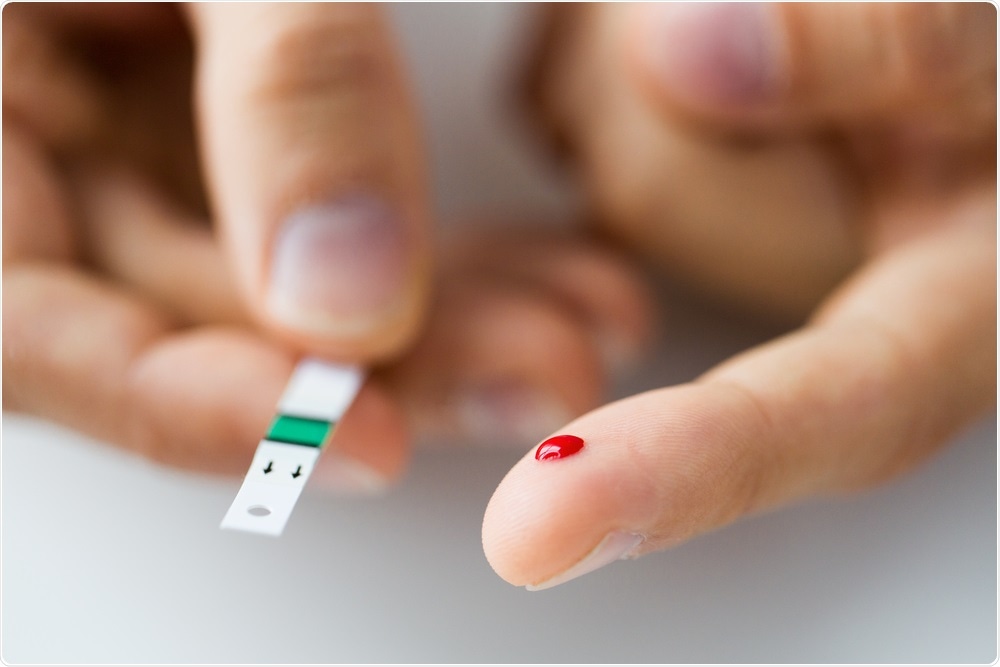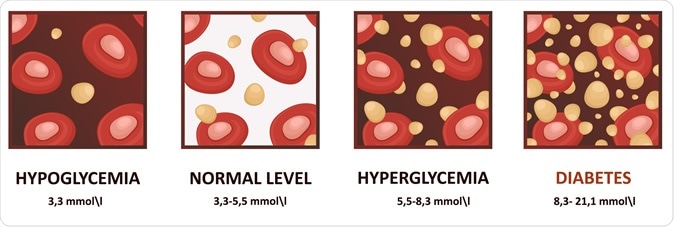The coronavirus disease (COVID-19) causes severe illness in people with underlying health conditions, such as heart disease, hypertension, lung illness, and diabetes. Now, scientists warn that viral infection may trigger the development of diabetes in healthy people.
An international team of diabetes experts notes that there is a bidirectional relationship between COVID-19 and diabetes. People with diabetes as an underlying health condition have a higher risk of contracting the contagion. On the other hand, new-onset diabetes has been seen in healthy people who contracted the virus.

Image Credit: Syda Productions / Shutterstock
New-onset diabetes
It was apparent early on in the pandemic that chronic health problems such as type 1 and type 2 diabetes increased the risk of a life-threatening infection from severe acute respiratory syndrome coronavirus 2 (SARS-CoV-2), the causative agent for COVID-19 disease.
Previous studies have shown that people with diabetes are more likely to die from COVID-19. Now, new evidence says that the link goes both ways – being infected with SARS-CoV-2 heightens a person’s risk of developing new-onset diabetes.
Diabetes is a chronic disease that occurs either when the pancreas does not produce enough insulin or when the body cannot effectively use the insulin it produces. Insulin is a hormone that regulates blood sugar. Hyperglycemia, or raised blood sugar, is a common effect of uncontrolled diabetes and, over time, leads to severe damage to many of the body's systems, especially the nerves and blood vessels.

Glucose in the blood. Image Credit: logika600 / Shutterstock
People with type 1 diabetes cannot produce insulin, which occurs at an early age. On the other hand, type 2 diabetes develops in adulthood, due to the inability of the pancreas to produce insulin, or insulin resistance, which happens when the cells stop responding to insulin.
Diabetes and hyperglycemia
It is still not clear what the mechanical relationship between extreme hyperglycemia and COVID-19 is, but health experts believe that it is tied to how the virus binds to the cells in the body.
SARS-CoV-2 binds to angiotensin-converting enzyme 2 (ACE2) receptors, which are expressed in vital metabolic organs and tissues, such as the pancreatic beta cells, the small intestines, adipose tissues, and the kidneys. Hence, it is possible that infection could affect the body’s blood-sugar related functions, and the same functions, if already damaged from diabetes, could make the infection worse.
“Thus, it is plausible that SARS-CoV-2 may cause pleiotropic alterations of glucose metabolism that could complicate the pathophysiology of preexisting diabetes or lead to new mechanisms of disease,” the authors wrote in the letter published in The New England Journal of Medicine (NEJM).
In the letter, the authors cite research showing that some people who contracted the original SARS virus, which first emerged in China in 2002 to 2003, also developed acute cases of diabetes during the disease course.
The team also said that the current pandemic has many unknowns. For instance, the new evidence shows the potential diabetogenic effect of COVID-19, which is beyond the well-known stress response linked to severe illness. However, it is still unclear if new-onset diabetes persists or goes away when the infection resolves is unclear.
Global registry
To answer these questions, the team composed of leading diabetes experts participating in the CoviDIAB Project, have generated a global registry of COVID-19 patients with diabetes. The registry’s goal is to establish the extent of new-onset diabetes, characterized by hyperglycemia.
“The registry, which will be expanded to include patients with preexisting diabetes who present with severe acute metabolic disturbance, may also be used to investigate the epidemiologic features and pathogenesis of Covid-19–related diabetes and to gain clues regarding appropriate care for patients during and after the course of Covid-19,” the team wrote.
Getting more case studies and data will help researchers better understand what is going on between diabetes and COVID-19. The researchers warn patients who think they have COVID-19 to watch out for diabetes symptoms, such as extreme fatigue, confusion, blurred vision, frequent bathroom breaks, and being extremely thirsty.
“Given the very short history of human infection with SARS-CoV-2, an understanding of how Covid-19–related diabetes develops, the natural history of this disease, and appropriate management will be helpful. The study of Covid-19–related diabetes may also uncover novel mechanisms of disease,” the team added.
Source:
Journal reference: